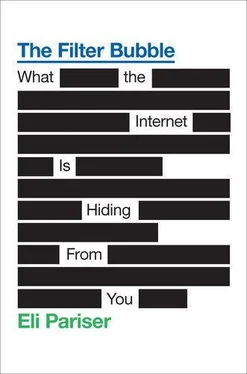And what tops the traffic charts? “If it bleeds, it leads” is one of the few news maxims that has continued into the new era. Obviously, what’s popular differs among audiences: A study of the Times ’s most-popular list found that articles that touched on Judaism were often forwarded, presumably due to the Times ’s readership. In addition, the study concluded, “more practically useful, surprising, affect-laden, and positively valenced articles are more likely to be among the newspaper’s most e-mailed stories on a given day, as are articles that evoke more awe, anger, and anxiety, and less sadness.”
Elsewhere, the items that top most-popular lists get a bit more crass. The site Buzzfeed recently linked to the “headline that has everything” from Britain’s Evening Herald: “Woman in Sumo Wrestler Suit Assaulted Her Ex-girlfriend in Gay Pub After She Waved at a Man Dressed as a Snickers Bar.” The top story in 2005 for the Seattle Times stayed on the most-read list for weeks; it concerned a man who died after having sex with a horse. The Los Angeles Times ’s top story in 2007 was an article about the world’s ugliest dog.
Responsiveness to the audience sounds like a good thing—and in a lot of cases, it is. “If we view the role of cultural products as giving us something to talk about,” writes a Wall Street Journal reporter who looked into the most-popular phenomenon, “then the most important thing might be that everyone sees the same thing and not what the thing is.” Traffic chasing takes media making off its Olympian heights, placing journalists and editors on the same plane with everyone else. The Washington Post ombudsman described journalists’ often paternalistic approach to readers: “In a past era, there was little need to share marketing information with the Post ’s newsroom. Profits were high. Circulation was robust. Editors decided what they thought readers needed, not necessarily what they wanted.”
The Gawker model is almost the precise opposite. If the Washington Post emulates Dad, these new enterprises are more like fussy, anxious children squalling to be played with and picked up.
When I asked him about the prospects for important but unpopular news, the Media Lab’s Nicholas Negroponte smiled. On one end of the spectrum, he said, is sycophantic personalization—“You’re so great and wonderful, and I’m going to tell you exactly what you want to hear.” On the other end is the parental approach: “I’m going to tell you this whether you want to hear this or not, because you need to know.” Currently, we’re headed in the sycophantic direction. “There will be a long period of adjustment,” says Professor Michael Schudson, “as the separation of church and state is breaking down, so to speak. In moderation, that seems okay, but Gawker’s Big Board is a scary extreme, it’s surrender.”
Google News pays more attention to political news than many of the creators of the filter bubble. After all, it draws in large part on the decisions of professional editors. But even in Google News, stories about Apple trump stories about the war in Afghanistan.
I enjoy my iPhone and iPad, but it’s hard to argue that these things are of similar importance to developments in Afghanistan. But this Apple-centric ranking is indicative of what the combination of popular lists and the filter bubble will leave out: Things that are important but complicated. “If traffic ends up guiding coverage,” the Washington Post ’s ombudsman writes, “will The Post choose not to pursue some important stories because they’re ‘dull’?”
Will an article about, say, child poverty ever seem hugely personally relevant to many of us, beyond the academics studying the field and the people directly affected? Probably not, but it’s still important to know about.
Critics on the left frequently argue that the nation’s top media underreport the war. But for many of us, myself included, reading about Afghanistan is a chore. The story is convoluted, confusing, complex, and depressing.
In the editorial judgment of the Times, however, I need to know about it, and because they persist in putting it on the front page despite what must be abominably low traffic rates, I continue to read about it. (This doesn’t mean the Times is overruling my own inclinations. It’s just supporting one of my inclinations—to be informed about the world—over the more immediate inclination to click on whatever tickles my fancy.) There are places where media that prioritize importance over popularity or personal relevance are useful—even necessary.
Clay Shirky points out that newspaper readers always mostly skipped over the political stuff. But to do so, they had to at least glance at the front page—and so, if there was a huge political scandal, enough people would know about it to make an impact at the polls. “The question,” Shirky says, “is how can the average citizen ignore news of the day to the ninety-ninth percentile and periodically be alarmed when there is a crisis? How do you threaten business and civic leaders with the possibility that if things get too corrupt, the alarm can be sounded?” The front page played that role—but now it’s possible to skip it entirely.
Which brings us back to John Dewey. In Dewey’s vision, it is these issues—“indirect, extensive, enduring and serious consequences of conjoint and interacting behavior”—that call the public into existence. The important matters that indirectly touch all of our lives but exist out of the sphere of our immediate self-interest are the bedrock and the raison d’être of democracy. American Idol may unite a lot of us around the same fireplace, but it doesn’t call out the citizen in us. For better or worse—I’d argue for better—the editors of the old media did.
There’s no going back, of course. Nor should there be: the Internet still has the potential to be a better medium for democracy than broadcast, with its one-direction-only information flows, ever could be. As journalist A. J. Liebling pointed out, freedom of the press was for those who owned one. Now we all do.
But at the moment, we’re trading a system with a defined and well-debated sense of its civic responsibilities and roles for one with no sense of ethics. The Big Board is tearing down the wall between editorial decision-making and the business side of the operation. While Google and others are beginning to grapple with the consequences, most personalized filters have no way of prioritizing what really matters but gets fewer clicks. And in the end, “Give the people what they want” is a brittle and shallow civic philosophy.
But the rise of the filter bubble doesn’t just affect how we process news. It can also affect how we think.
It is hardly possible to overrate the value… of placing human beings in contact with persons dissimilar to themselves, and with modes of thought and action unlike those with which they are familiar…. Such communication has always been, and is peculiarly in the present age, one of the primary sources of progress.
—John Stuart Mill
The manner in which some of the most important individual discoveries were arrived at reminds one more of a sleepwalker’s performance than an electronic brain’s.
—Arthur Koestler,
The Sleepwalkers
In the spring of 1963, Geneva was swarming with diplomats. Delegations from eighteen countries had arrived for negotiations on the Nuclear Test Ban treaty, and meetings were under way in scores of locations throughout the Swiss capital. After one afternoon of discussions between the American and Russian delegations, a young KGB officer approached a forty-year-old American diplomat named David Mark. “I’m new on the Soviet delegation, and I’d like to talk to you,” he whispered to Mark in Russian, “but I don’t want to talk here. I want to have lunch with you.” After reporting the contact to colleagues at the CIA, Mark agreed, and the two men planned a meeting at a local restaurant the following day.
Читать дальше











